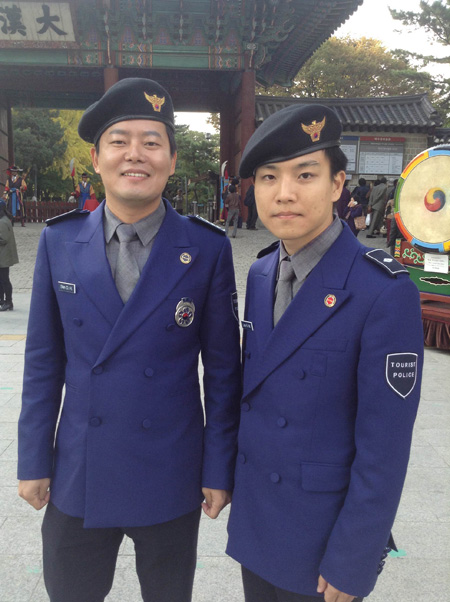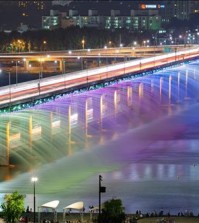- California Assembly OKs highest minimum wage in nation
- S. Korea unveils first graphic cigarette warnings
- US joins with South Korea, Japan in bid to deter North Korea
- LPGA golfer Chun In-gee finally back in action
- S. Korea won’t be top seed in final World Cup qualification round
- US men’s soccer misses 2nd straight Olympics
- US back on track in qualifying with 4-0 win over Guatemala
- High-intensity workout injuries spawn cottage industry
- CDC expands range of Zika mosquitoes into parts of Northeast
- Who knew? ‘The Walking Dead’ is helping families connect
Tourist police patrol major attractions in Seoul
By Kwon Ji-youn

Sgt. Shin Chang-hoon, left, a tourist police officer, poses with his colleague Lee Kyung-min in front of Deoksu Palace while patrolling the area last month. (Korea Times photo by Kwon Ji-youn)
As a result of hallyu, or the “Korean Wave,” some 11 million foreign tourists swarmed to South Korea last year, fueling the number of visitors’ complaints that continues to increase year after year.
To address the problem, the National Police Agency launched a “tourist police” unit in cooperation with the Ministry of Culture, Sports and Tourism last month.
The ministry and the agency understand that the more tourists complain, the less likely they are to return to Korea.
The tourist police provide visitors with a range of services.
“We try to make sure foreign tourists feel comfortable during their stay in Korea,” said Sgt. Shin Chang-hoon, a tourist police officer. “We guide them toward their destinations, and provide them with information on tourist attractions.”
Tourist police also keep an eye out for touting, illegal call-van services, unqualified tour guides and pickpockets.
“The fact that we’re patrolling has a visible effect,” Shin said.
The tourist police patrol seven areas popular with visitors to Korea, including Myung-dong, Itaewon, Hongdae and Insa-dong.
“I applied for this position because I thought it would give me a chance to apply what I’ve learned,” Shin said. “It’s rare that one is given the chance to apply their specialty directly to their trade.”
The 101 tourist police officers received specialized instruction _ including language classes and “courtesy training” _ before being put on the street.
“We focused on English, Japanese and Chinese, because those are the tourists the country attracts the most,” said Lee Kyung-min, a police officer and Shin’s partner.
“It’s great, because when we return to our quarters, we can learn so much from each other since we all specialize in different languages.”
One drawback of being in such a newly established unit is that there are no seniors from whom to seek advice.
“There are a lot of details we need to fix, because our unit was just formed,” Lee said.
But Lee felt a definite sense of pride in guiding his first tourist to her destination.
“It was further down, so I accompanied her all the way there,” he explained. “It was evident just how grateful she was.”
But all in all, Lee stressed that their primary task is not to act as tour guides
.
“We need to take action to deal with inconveniences that tourists experience while they’re visiting Korea,” he said.
“In the end, we hope that our service as tourist police will contribute to the promotion of the tourism industry and attracting more tourists,” Shin added.












![일본 사도광산 [서경덕 교수 제공. 재판매 및 DB 금지]](http://www.koreatimesus.com/wp-content/uploads/2024/07/PYH2024072610800050400_P4-copy-120x134.jpg)


